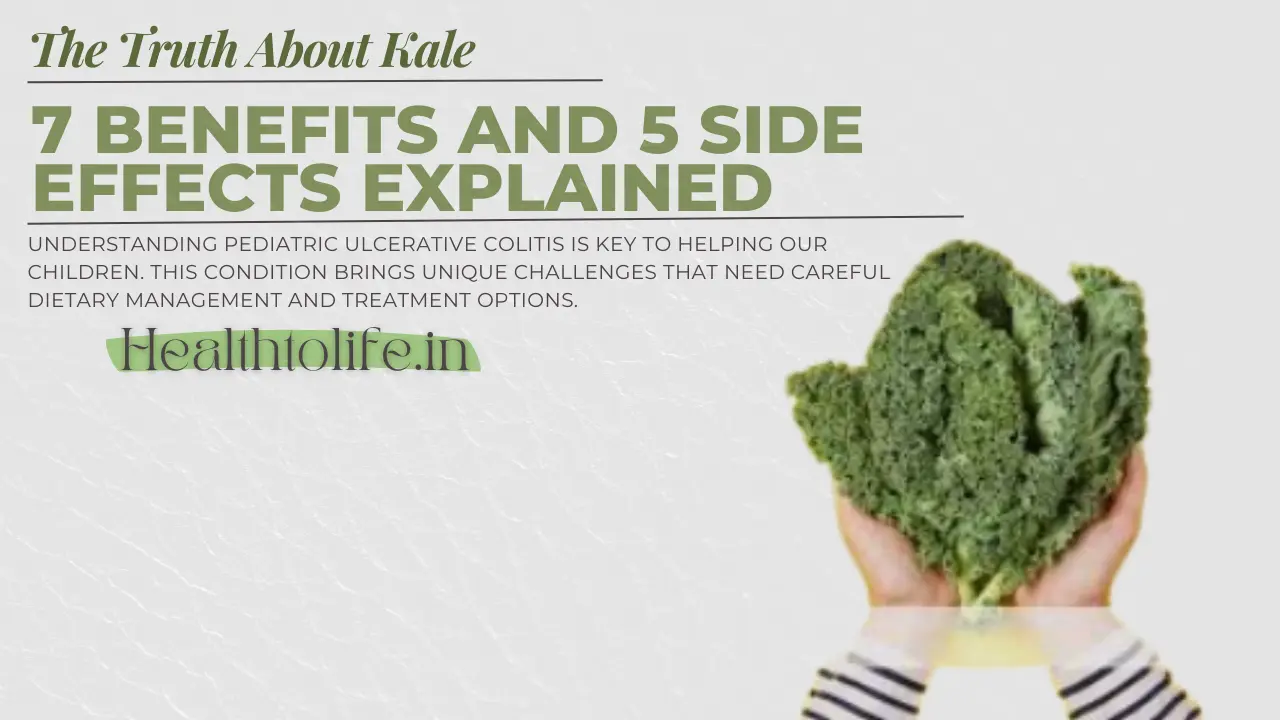
Introduction to Kale – A Superfood Worth Exploring
Kale has earned its reputation as a nutrient-dense superfood, packed with vitamins, minerals, and antioxidants. But like any food, it comes with both health benefits and potential side effects you should know before adding it to your diet.
Whether you’re looking to boost immunity, support heart health, or simply eat more healthfully, understanding kale’s advantages and drawbacks can help you make informed choices. In this guide, we’ll break down the proven benefits of kale, possible risks, and how to enjoy it safely.
Let’s dive into why this leafy green deserves—or maybe doesn’t deserve—a permanent spot on your plate.
Table of Contents
- What Is Kale, and Why Is It Called a Superfood?
- Understanding This Nutrient-Packed Supergreen
- Kale Benefits: Why This Supergreen Deserves a Spot in Your Diet
- How to Get the Most Benefits from Kale
- Kale Side Effects: Who Should Be Cautious With This Supergreen?
- Final Thoughts: Is Kale Right for You?
- Frequently Asked Questions About Kale
- Related Video | Kale Benefits And Side Effects
What Is Kale, and Why Is It Called a Superfood?
Kale isn’t just another leafy green—it’s a nutritional powerhouse that has taken the health world by storm. Packed with vitamins A, C, and K, fiber, and powerful antioxidants, kale offers numerous health benefits, from boosting immunity to supporting heart health.
But before you load up your plate, it’s essential to also understand its potential side effects, especially for those with thyroid concerns or kidney issues.
In this article, we’ll explore the proven benefits of kale, its possible drawbacks, and how to enjoy it safely. Whether you’re a kale enthusiast or just curious, this guide will help you make the best choices for your health.
Understanding This Nutrient-Packed Supergreen
Kale isn’t just a trendy salad ingredient – it’s one of the most nutrient-dense foods on the planet. This leafy green superstar delivers an incredible vitamin and mineral boost in every serving, but it’s not perfect for everyone.
While kale offers impressive health benefits, from strengthening bones to fighting inflammation, it also comes with some potential drawbacks you should know about. Maybe you’ve heard it can interfere with thyroid function or cause digestive issues in some people.
In this comprehensive guide, we’ll separate fact from fiction, giving you a balanced look at kale’s pros and cons. You’ll discover:
- The science-backed benefits that make kale so special
- Possible side effects and who should be cautious
- The best ways to prepare kale to maximize nutrition
- How much kale is good for you
Whether you’re a health enthusiast or just kale-curious, this guide will help you make informed decisions about adding this supergreen to your diet.
Kale Benefits: Why This Supergreen Deserves a Spot in Your Diet

Kale isn’t just a trendy, leafy green—it’s a nutritional powerhouse backed by science. Whether you’re looking to boost immunity, support heart health, or simply eat more healthfully, kale delivers impressive benefits. But what exactly makes it so special?
Let’s break down the top science-backed benefits of kale and how to make the most of them:
1. Packed with Essential Nutrients
Kale is one of the most nutrient-dense foods on the planet. Just one cup (67g) of raw kale provides:
✔ Vitamin K (684% DV) – crucial for blood clotting and bone health
✔ Vitamin C (134% DV) – boosts immunity and skin health
✔ Vitamin A (206% DV) – supports vision and immune function
✔ Manganese, Copper, and Calcium – important for metabolism and bone strength
Unlike many greens, kale also contains fiber, antioxidants, and even plant-based omega-3s, making it a true superfood.
2. Rich in Powerful Antioxidants
Kale is loaded with quercetin and kaempferol, antioxidants that combat oxidative stress and inflammation. Studies suggest these compounds may help:
✓ Lower blood pressure
✓ Reducing chronic inflammation
✓ Protect against certain diseases
3. May Support Heart Health
Research shows that kale can help:
✔ Lower LDL cholesterol (the “bad” kind)
✔ Increases HDL cholesterol (the “good” kind)
✔ Reduces arterial stiffness due to its high potassium and fiber content
4. Great for Eye Health
Kale contains lutein and zeaxanthin, two carotenoids that:
✓ Protect against macular degeneration
✓ Filters harmful blue light
✓ Improving overall vision health
5. May Aid in Detoxification
Kale’s sulfur compounds support the body’s natural detox processes by activating liver enzymes that flush out toxins.
How to Get the Most Benefits from Kale
✔ Eat it raw or lightly steamed (overcooking destroys nutrients)
✔ Pair with healthy fats (like olive oil or avocado) for better absorption of fat-soluble vitamins
✔ Rotate with other greens to avoid overconsumption of goitrogens (which may affect thyroid function in large amounts)
Final Thoughts
Kale’s benefits are hard to ignore—it’s a low-calorie, high-nutrient food that can enhance any diet. However, moderation is key, especially for those with thyroid concerns.
Want to learn about potential side effects? [Check our full guide on the benefits and Side Effects.
Kale Side Effects: Who Should Be Cautious With This Supergreen?
While kale is packed with nutrients, it’s not perfect for everyone. Overconsumption or certain health conditions may lead to unexpected side effects. Here’s what you need to watch for:
1. May Affect Thyroid Function (Goitrogenic Effects)
Kale contains goitrogens, compounds that can interfere with iodine absorption and potentially disrupt thyroid hormone production. This is mainly a concern if:
✔ You eat large amounts raw (cooking reduces goitrogens)
✔ You already have hypothyroidism or iodine deficiency
✔ Your diet is very high in raw cruciferous vegetables (like broccoli, Brussels sprouts)
Solution: Lightly steam or sauté kale, and ensure adequate iodine intake (from seafood, iodized salt, or seaweed).
2. Can Cause Digestive Issues
Kale is high in fiber and raffinose, which can lead to:
✓ Bloating
✓ Gas
✓ Stomach cramps (especially if you’re not used to high-fiber foods)
Tip: Start with small portions and drink plenty of water to help digestion.
3. May Contribute to Kidney Stones
Kale is rich in oxalates, which can bind with calcium and form kidney stones in susceptible individuals.
✔ High-risk groups: People with a history of calcium-oxalate stones
✔ Cooking kale reduces oxalates slightly, but moderation is key.
4. Blood Thinning Concerns (Vitamin K Overload)
Kale is extremely high in vitamin K, which helps blood clotting. While great for most people, it could interfere with blood-thinning medications (like warfarin).
✔ If you’re on blood thinners, keep your kale intake consistent (don’t suddenly eat a lot more or less).
5. Pesticide Residue Risk (If Not Organic)
Conventional kale often ranks high on the EWG’s “Dirty Dozen” list for pesticide residue.
✔ Opt for organic kale when possible.
✔ Wash thoroughly even if organic.
Who Should Limit Kale?
✔ People with thyroid disorders
✔ Those prone to kidney stones
✔ Individuals on blood thinners
✔ Anyone with a sensitive digestive system
Safe Consumption Tips
✔ Rotate greens (don’t eat kale daily in large amounts)
✔ Cook it lightly to reduce goitrogens and oxalates
✔ Pair with lemon/vinegar (helps reduce oxalate absorption)
Final Verdict
Kale is still a superfood, but like anything, balance is key. If you have any of the above concerns, adjust your intake rather than cutting it out completely.
Final Thoughts: Is Kale Right for You?
Kale is undoubtedly a nutritional superstar, offering an impressive range of vitamins, minerals, and antioxidants that can benefit nearly everyone. From boosting immunity to supporting heart health, its advantages are well-documented.
However, like any food, it’s not perfect. The key is balance and awareness:
✔ Enjoy kale in moderation – 2-3 servings per week is plenty for most people
✔ Prepare it wisely – light cooking helps reduce potential downsides
✔ Listen to your body – if you notice digestive discomfort or other issues, adjust your intake
For most healthy individuals, kale is a fantastic addition to a varied diet. But if you have:
✓ Thyroid concerns
✓ Kidney stone history
✓ Blood-thinning medication
✓ Digestive sensitivities
You may need to modify how much and how you eat it.
The Bottom Line:
Kale is worth the hype, but it shouldn’t be your only green. Rotate it with spinach, arugula, and other leafy vegetables to get a broad spectrum of nutrients without overdoing any one compound.
When enjoyed sensibly, kale can be one of the healthiest choices in your diet – just don’t treat it as a “more is always better” food.
Frequently Asked Questions About Kale
Ques-1. Is it safe to eat kale every day?
Ans: While kale is nutritious, eating it daily in large amounts may lead to potential issues like thyroid interference or digestive discomfort. For most people, 2-3 servings per week is a safe amount. Rotate with other greens like spinach or Swiss chard for variety.
Ques-2. Does cooking kale reduce its nutrients?
Ans: Light cooking (steaming or sautéing) actually improves the availability of some nutrients while reducing oxalates and goitrogens. However, boiling for too long can leach out water-soluble vitamins like vitamin C.
Ques-3. Can kale help with weight loss?
Ans: Yes! Kale is low in calories but high in fiber, which helps keep you full. Its high water content and nutrient density make it a great addition to weight-loss diets.
Ques-4. Is raw kale bad for you?
Ans: Raw kale is safe for most people but contains more goitrogens and oxalates than cooked kale. If you have thyroid issues or are prone to kidney stones, lightly cooking it is better.
Ques-5. Does kale interact with medications?
Ans: Kale’s high vitamin K content can interfere with blood thinners like warfarin. If you’re on these medications, keep your kale intake consistent and consult your doctor.
Ques-6. Is organic kale worth it?
Ans: Conventional kale often carries pesticide residues, so organic is preferable if possible. If not, wash it thoroughly with a baking soda soak or vinegar rinse.
Ques-7. Can kale cause bloating or gas?
Ans: Yes, due to its high fiber and raffinose content. If you’re new to kale, start with small portions and increase gradually to let your gut adjust.
Ques-8. Is kale better than spinach?
Ans: Both are excellent! Kale has more vitamin C and calcium, while spinach provides more iron and folate. The best approach is to eat both for a balanced nutrient intake.
Ques-9. Can I freeze kale?
Ans: Yes! Blanch it first (dip it in boiling water for 2 minutes, then in ice water) to preserve texture and nutrients before freezing.
Related Video | Kale Benefits And Side Effects
Regards: Healthtolife. in
Related Article: https://bit.ly/3BAbk1Q
Was this article helpful?
Stay updated with the latest posts on HealthToLife—expert health tips, wellness trends, and life-changing advice you don’t want to miss. Click to explore.



